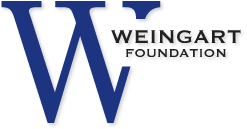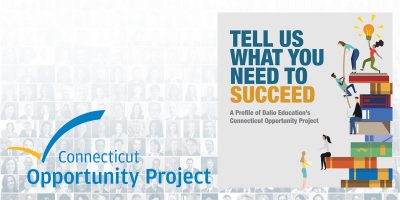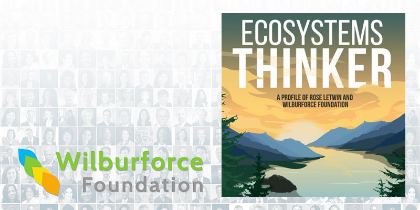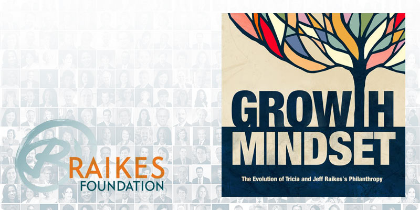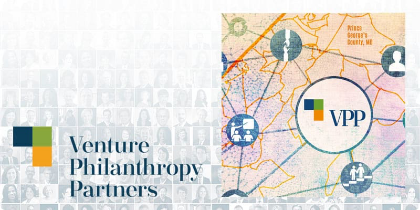Two decades ago, Fred Ali, the leader of a nonprofit serving homeless youth, walked into the lobby of an imposing downtown Los Angeles office tower and pressed the button for the 30th floor. He got out of the elevator and headed toward the office suite of the Weingart Foundation.
Although Weingart was founded in the 1950s by a humble, self-described “anonymous orphan,” it had become an intimidating place for grantseekers. The Weingart board consisted entirely of powerful business leaders, and its decisions had huge stakes for hundreds of nonprofits throughout Southern California.
Before Ali entered Weingart’s office suite, he turned around and headed back down the elevator. “I was so nervous,” he recalls. “I went up and down the elevator five times before I got up the courage to walk in.”
Today, Weingart is a very different place. When you ride the elevator up to Weingart’s office today, you find warm, empathetic professionals who are passionate about social equity and effective philanthropic practice. And that has a lot to do with the fact that Ali now runs the foundation and has built a remarkable team who share his first-hand understanding of the needs and challenges of nonprofits and their beneficiaries.
I was so nervous. I went up and down the elevator five times before I got up the courage to walk in.
—Fred Ali
CEO, Weingart Foundation
Slow and Steady Wins the Race
Unlike some of the previous profiles in this “Funding Performance” series, this isn’t a story of new leadership coming into an organization and effecting rapid transformation.
When Ali was hired, he didn’t have a sweeping mandate. His title was Chief Administrative Officer. The chairman of the board, who came to the office three days a week, held the CEO title.
“I started slowly and incrementally,” Ali says. “I knew there was an opportunity to help the foundation move to a systems-change orientation. And I liked the challenge of turning an organization around. But I knew I had to build trust first.” He did so by leveraging the knowledge he had gained working in and around the nonprofit sector.
Empathy for ‘the Other’
Ali’s father was an immigrant from Southern Italy, with a last name and complexion that suggested roots in Northern Africa. Growing up in an Italian-American family in the Chicago area wouldn’t normally have exposed Ali to the feeling of being an outsider, but he was bullied mercilessly for a speech impediment he had as a young kid. “I don’t talk a lot about this, but that was a hard time in my life. That bullying and ridicule got me in touch with ‘the other’ in society.”
Ali stayed in Alaska working with and supporting Native people for the next 17 years. “I loved my time in Alaska, but I learned what it means to be in a distinct minority and at times to be discriminated against because of my race,” Ali says. For good reason, many Yupik people resented that Ali was there. One of them was Liz, an activist in her community, who later became his wife. “In her mind, I was just another white guy in her region probably there to do no good.”
Liz and her Yupik family eventually came to see in Ali what Weingart grantees see today: an approachable man with a passion for fairness, inclusion, and equity. Fred and Liz got married in 1977. In addition to raising four daughters of their own, they also played a huge role in the lives of many other children who wandered into their lives and needed a stable home. The Ali family moved to Los Angeles in 1989, when Ali was recruited to lead Covenant House. He spent the next ten years turning a small community-based organization into a large, outcomes-focused, multi-service agency.
The Right People in the Right Seats
Ali’s first big opportunity to begin shifting the culture at Weingart came in 2000, his second year on the job. At the board’s annual retreat, Ali presented a review of the nonprofit sector in Southern California from his perspective as a former practitioner. “I spent a lot of time on the presentation. I brought in data to augment my own experiences. I found the board was willing to listen to me. I think I opened a lot of eyes that day.”
 After that presentation, Ali felt he had begun to gain enough trust from the board to start getting the right people on the bus in the right seats, to borrow from management guru Jim Collins. His first hire was a huge win for the organization: Belen Vargas, who brought nearly ten years of nonprofit experience and continues to work hand-in-glove with Ali to this day.
After that presentation, Ali felt he had begun to gain enough trust from the board to start getting the right people on the bus in the right seats, to borrow from management guru Jim Collins. His first hire was a huge win for the organization: Belen Vargas, who brought nearly ten years of nonprofit experience and continues to work hand-in-glove with Ali to this day.
Vargas was born and raised in East LA, the daughter of laborer who spent his career operating a record-pressing machine after he arrived in the U.S. as an undocumented immigrant from Mexico.
When Vargas was nine, her sister, Raquel, was born with a severe intellectual disability. As the oldest child, Vargas became responsible for helping her family secure medical and social services for her sister. Her parents had very little formal education in Mexico and didn’t read or write English. “Trying to access resources for Raquel was very challenging 40 years ago,” Vargas recalls. “I have an autistic son, and even with all my knowledge and contacts it is still hard today.”
Vargas, the first person in her family to attend college, attended Cal State Los Angeles. She then went on to earn a law degree from USC and went to work advocating for children with disabilities. “I know it sounds corny, but [from a very early age] I knew that whatever I did in my life it would be focused on providing access and resources to those that are marginalized and underserved.”
Around 2006, when Ali was named CEO of Weingart Foundation, he and Vargas began to fill out the Weingart professional team. They did so by prioritizing nonprofit experience, diverse backgrounds, and the ability to support nonprofit leaders’ pursuit of performance.
I feel completely confident in confiding in anyone at Weingart, from Fred Ali to our program officer.
—Kay Buck
CEO, CAST
When you visit Weingart’s offices, you can’t help but notice that the staff is extremely diverse. Fifteen of Weingart’s 19 staff members are people of color. Senior Program Officer Rosa Benitez is the daughter of Mexican immigrants who lived in the San Gabriel Valley without documentation for many years. Vy Nguyen, director of special projects and communications, came to the United States as a young refugee of the Vietnam War. And diversity at Weingart means more than just different races and ethnicities. Angela Carr, a grants manager who is white, struggled with homelessness at a young age and food insecurity throughout her childhood.
This rare diversity of background and life experience can be seen on Weingart’s board as well. Board Chair Monica Lozano is the daughter of first-generation Mexican-Americans and the former publisher of La Opinión, the largest Spanish-language newspaper in the U.S. More than half of the board—five out of nine members—are people of color. Eight of nine of have served in executive leadership roles at foundations, nonprofits, or government agencies.
As the foundation added racial, ethnic, and socioeconomic diversity, it added new layers of expertise. The board and staff are both stocked with members who are knowledgeable about the issues facing low-income communities, have first-hand experience building strong organizations, and have deep relationships in the six counties in which Weingart operates. When asked to provide suggestions on how Weingart could improve, one anonymous grantee said, “Help other foundations to work from the kind of community knowledge and engaged compassion that characterizes … Weingart Foundation.”
Flexible Support
When Ali arrived at Weingart in 1999, most of the foundation’s funding was in the form of restrictive program and capital grants. Over time, Ali and Vargas helped the board see the virtue in helping nonprofits build their core organizational infrastructure. They took a page from Chicago Mayor Rahm Emanuel‘s playbook and used the country’s 2008 financial crisis as an opportunity to take a big, progressive leap forward. Based on insights from grantees and program officers, they made the case to the board that nonprofits—struggling with both revenue shortfalls and a dramatic surge in demand for services—needed flexible resources to survive. “When the financial crisis hit … I made the argument for unrestricted support, and it really made sense to the board,” recalls Ali. And when the board gave the go-ahead, “We brought in some of our grantees to help design our approach.”
Today, the majority of Weingart’s gifts are in the form of multi-year unrestricted operating support—with the full value of the grant almost always going to the grantee up front. Tony Brown, the CEO of Heart of Los Angeles, used this support to hire the organization’s first chief operating officer and strengthen its development capacity—functions that are critical for effective management and financial sustainability and yet other foundations are reluctant to fund.
Most of the evaluation work that I had had to do for funders … was all about checking the box. It was in no way benefiting the organization I was running.
—Fred Ali
CEO, Weingart Foundation
Kay Buck, the CEO of CAST (the Coalition to Abolish Slavery and Trafficking), used the funding to build the organization’s development and communications infrastructure “at a time when most foundations only wanted to fund programs.”
Johng Ho Song, the executive director of the Koreatown Youth and Community Center, used Weingart’s unrestricted operating support to strengthen the organization’s capacity to meet the complex needs of residents of its 60-unit supportive-housing apartment building. “If we were limited to secured program funds, I’m sure we would not have been able to successfully transition some of our families from homelessness to engaged participants in our community.”
Dr. Lisa Abdishoo, the president and CEO of Los Angeles Christian Health Centers, used Weingart’s flexible dollars to strengthen infrastructure in often-neglected administrative areas like data analysis, quality improvement, and fund development. As a direct result, “Third-party billing revenue has increased from $1.3 million to over $5 million over the course of our last two grant periods, allowing us to grow our services from 30,000 visits per year to more than 60,000. We received Patient-Centered Medical Home designations at both of our full-time clinic sites from the National Committee for Quality Assurance. The annual number of active donors has increased from 30 to over 200, and we have launched a successful capital campaign that has brought in over $4 million in private funds along with a $3.7 million public grant.”
In the past year, Weingart has added new forms of flexible support to its toolbox: equity investments, loans, and loan guarantees (known as program-related investments, or PRIs). Thanks to its new PRI Fund, the foundation is leveraging not only its $32 million grants budget but also its $750 million endowment for the benefit of grantees. So far, it has awarded $15 million in PRIs to community organizations increasing permanent supportive housing and organizations and those bringing new or expanded services to underserved communities.
Speaking Up for Grantees and Beneficiaries
Ali, Vargas, and their colleagues haven’t been shy about making the case for unrestricted support and grants that reflect the full cost of delivering services. “I think a lot of foundations are interested in buying outcomes and are not terribly interested in really supporting organizations,” Ali told Philanthropy News Digest. “Funders may not explicitly say that, but the incessant focus on restricted programmatic funding has come at a huge cost to our sector.” This belief has led Weingart to take a bold stand with other funders as well as with local and regional governments.
 Using its voice to speak up for its grantees and those the grantees serve is a huge departure from previous practice. As Ali said at the Regional Association of Grantmakers meeting in July 2017, “When I first [joined] the foundation 18 years ago, [the board had] strict prohibitions against supporting advocacy, and the idea of working with government was not to be discussed.”
Using its voice to speak up for its grantees and those the grantees serve is a huge departure from previous practice. As Ali said at the Regional Association of Grantmakers meeting in July 2017, “When I first [joined] the foundation 18 years ago, [the board had] strict prohibitions against supporting advocacy, and the idea of working with government was not to be discussed.”
Under Ali and Vargas’s leadership, and with the support and encouragement of the board, Weingart has transitioned from a foundation that eschews advocacy altogether to one that now walks “right up to the limits of what’s allowable for a private foundation,” in Ali’s words. Weingart uses its voice and advocacy grants to advance a wide array of causes aligned with the foundation’s mission of advancing social and economic equity—even more so since the 2016 elections. “Much of the infrastructure that was built to help achieve equity through such things as healthcare, immigrant integration, and the social safety net are under attack,” Ali told the Regional Association of Grantmakers audience. “Foundations [should be] using their voice, influence, and resources to engage directly with government around issues of common concern.”
A Framework for Learning
When Ali joined the foundation in 1999, the board had little interest in evaluation. “They would have considered it a waste of time,” Ali says.
Ali had a similar bias, owing to his experiences as a grantseeker. “Most of the evaluation work that I had to do for funders was a total waste of time. It was all about checking the box. It was in no way benefiting the organization I was running. I don’t even think it was benefiting the foundations that pushed us to do it. The information was just going into a black box somewhere.”
But Ali knew that a foundation focused on learning rather than compliance could add a lot of value through the right kind of assessments. So with the full engagement of the board, the foundation created a Learning and Assessment Framework, which the foundation began implementing in 2016. “Our current chair, Monica Lozano, came in asking great questions, like ‘What’s the impact of the work? And how do we measure it?’ John Mack, who previously ran the Los Angeles Urban League, was raising similar questions, while insisting that the learning had to be for both sides.”
Today, Joyce Ybarra serves as the foundation’s director of learning. Rather than focusing on grantees’ programmatic outcomes (e.g., improved health, graduation rates), Ybarra and her colleagues give more attention to grantees’ organizational outcomes—that is, how they’re progressing across nine core areas needed for organizational effectiveness. (Weingart’s nine core areas, which were co-developed with its grantees, map very well to the Performance Imperative’s seven pillars of high performance.)
In place of traditional reports, Ybarra asks grantees to fill out surveys (PDF) on how they’re using the foundation’s unrestricted operating support and if/how those investments are strengthening their organizational infrastructure.
The foundation is transparent about what it learns from these surveys. In 2017, it shared all of the baseline data (PDF) it gleaned from its first full year of using the framework. One of the key learnings was that grantees tend to use Weingart’s flexible dollars to strengthen core organizational disciplines in which they are weak rather than using the money to meet payroll or expand services. In 2018, Weingart will have enough longitudinal data to expand its understanding of how unrestricted dollars contribute to grantee capacity and effectiveness. These new data could have tremendous value not only for Weingart and its grantees but also for other foundation leaders eager to make the case to their boards for investing holistically in the performance of their grantees.
Invested in Strong Relationships
Weingart doesn’t see its grantees as mere contractors. It sees them, and treats them, like professionals whose insights, expertise, and efforts are critically important for Weingart’s own effectiveness. In Vargas’s words, “Without trust … core support, or for that matter, any other form of grantmaking won’t work.”
Weingart builds trust relationships in part by building a staff and board who have walked in the shoes of their grantees and offering many of those grantees unrestricted operating support. But those steps are just part of the Weingart approach to reducing the power imbalance that kept Ali going up and down the elevator when he was a grantseeker. The foundation regularly invites grantees into board meetings, conducts listening tours to encourage grantees to share their perspectives (providing stipends for their time), and is careful to avoid asking grantees for paperwork that is of little use to them or the foundation.
We love working with our grant officer…. She consistently asks us tough questions that make us think strategically…. She truly listens to our feedback.
—Dr. Lisa Abdishoo
CEO, Los Angeles Christian Health Centers
To assess the strength of its relationships with grantees with clear eyes, Weingart asked the Center for Effective Philanthropy to conduct anonymous surveys of all of its grantees. The resulting Grantee Perception Report, which Weingart made publicly available (PDF), showed that Weingart’s grantees give the foundation and its staff extremely high marks for their impact on grantees’ fields and for their responsiveness, fairness, and clear communication. Here are some grantee quotations from the Grantee Perception Report:
- “The honest communication, guidance, and partnership from the program officers is such a strength of the Weingart Foundation.”
- “Of all the foundations we work with, Weingart’s program officers are the most transparent and helpful.”
- “They are supporting capacity building and innovation in our field that creates real change. They are truly committed to seeing us as the experts.”
- “We find the foundation [to be]…one of the most understanding of the challenges for nonprofit agencies.”
- “The foundation is committed to maintaining the highest level of responsiveness to community needs and establishes best practices based on real, current assessments.”
To augment this anonymous feedback, we reached out to five representative grantees to discuss their work with Weingart. The views we heard were incredibly positive and consistent. Here are some excerpts:
- Nina Revoyr, the Ballmer Group’s Los Angeles Director and former Chief Operating Officer of Children’s Institute: “I think they’re terrific. Now that I’m at the Ballmer Group, I see that the most important thing I’ve taken from Weingart is relating to grantees. They hired people from the field, with on-the-ground experience. It makes them see grantees differently when they’ve been on the grantee side of the table. It erases the distance.”
- Kay Buck of CAST: “Weingart creates a safe space for transparency and honesty. With some foundations, it is more common to feel penalized. Our program officer is absolutely a partner…. Fred and Belen, too, are so incredibly accessible and generous with their time, insights, and connections. I feel completely confident in confiding in anyone at Weingart, from Fred to our program officer.”
- Lisa Abdishoo of Los Angeles Christian Health Centers: “We love working with our grant officer. She consistently asks us tough questions that make us think strategically about how best to build our capacity and achieve our mission. She pushes us on issues like establishing and growing our reserves, building our fund development capacity, and improving board member engagement. She truly listens to our feedback.”
- Johng Ho Song of the Koreatown Youth and Community Center: “Fred Ali and his team have done such wonderful work advocating for nonprofits, [and] we couldn’t ask for a better partner in our work than Joyce Ybarra. She understands nonprofits and our agency specifically. When the foundation saw we didn’t have a dedicated operational reserve, she ensured we had seed funding and held our feet to the fire to create a formal policy in which the board of directors could feel confident.”
- Tony Brown of Heart of Los Angeles: “I feel respected as an expert in my field…. Not only are they open; they ask for my input, which is still unique among funders. I consider them to be advisors, connectors, and truly partners. Recently—and unusually for a funder—they helped us problem-solve a monumental challenge…. Their advice and connections were invaluable.”
Conclusion
In 1890, when Benny Weingarten (he later shortened the name) was just four years old, his dying single mother traveled to Atlanta and left Benny and his two younger brothers in the care of the Hebrew Orphans Asylum. Two years later, Benny was adopted by a single woman named Miller, who put the six-year-old to work picking cotton on a patch of red dirt she sharecropped with her polio-stricken daughter.
Fourteen years later, when Benny traveled to California on a railroad boxcar, he landed a job delivering laundry to downtown Los Angeles hotels on a horse named Lucky. By rising hours before his competition and pinching pennies, he acquired equity in the laundry company and eventually bought it outright. He later branched out into hotels and other properties—amassing a huge fortune in Southern California real estate.
Not only are they open. They ask for my input, which is still unique among funders.
—Tony Brown
Executive Director, Heart of Los Angeles
Weingart gave away a relatively small percentage of his wealth during his lifetime. But when he made gifts to support the communities in which he built properties, he typically made them in the name “Anonymous,” a poetic nod to his humble origins.
In the 37 years since Weingart’s passing, his foundation has experienced profound transformation—from generous corporate giver to one of the most forward-looking changemakers in America. Ali and Vargas moved slowly to effect this change. They started by hiring team members who had walked in grantees’ shoes and had backgrounds as diverse as the organizations they support. As board slots opened up, they added new, diverse members, who pushed the foundation to do everything possible for communities hit the hardest by persistent poverty.
Ali and Vargas clarified their theory of change, which helped them see that the clearest pathway to impact was by helping good organizations become great ones. They clarified the core disciplines that help organizations go from good to great and helped team members strengthen their expertise in those areas. They phased out overly restrictive grants and moved wholesale into unrestricted operating support.
They demonstrated, through emotional intelligence and empathy, that applicants and grantees could feel comfortable not only taking that elevator up Weingart’s office suite but also sharing weaknesses and missteps. They learned the rules of nonprofit advocacy and then committed to use their voice and influence to advance equity in Southern California, fight for fairness and inclusion at a time when these fundamental precepts are under fire, and convince peer foundations to join in.
Today, Weingart isn’t one of the largest or best-known foundations in America. You don’t hear a baritone announcer call out its name on NPR, and you don’t read about its grants in the national press. But it has great people up and down the organization committed to making their region more fair and equitable. And, most important of all, it has board members, executive leaders, and staff members who aren’t just open but eager to learn how they can get better and better over time at meeting that critically important mission.
The narrative of Ben Weingart’s life is an Only in America story. So too is the entrepreneurial, learning-and-improvement journey of the foundation that bears his name.
Do you want to learn more about how donors and grantees can work together to enhance their effectiveness? Read about Funding Performance here, and let us know your thoughts.
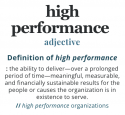
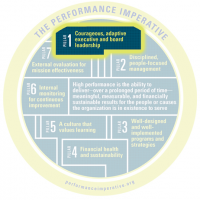
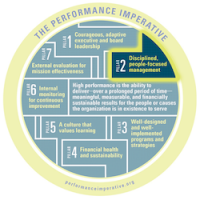
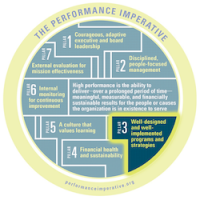
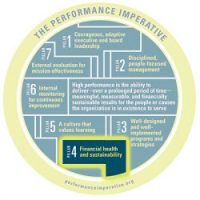
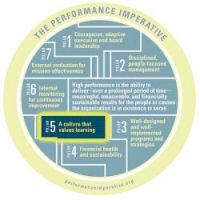
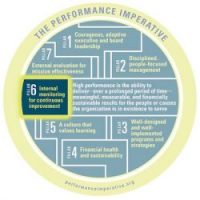
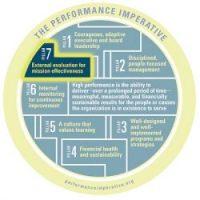
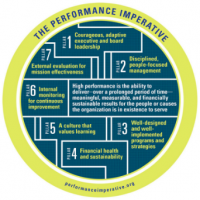
 After that presentation, Ali felt he had begun to gain enough trust from the board to start getting the right people on the bus in the right seats, to borrow from management guru Jim Collins. His first hire was a huge win for the organization: Belen Vargas, who brought nearly ten years of nonprofit experience and continues to work hand-in-glove with Ali to this day.
After that presentation, Ali felt he had begun to gain enough trust from the board to start getting the right people on the bus in the right seats, to borrow from management guru Jim Collins. His first hire was a huge win for the organization: Belen Vargas, who brought nearly ten years of nonprofit experience and continues to work hand-in-glove with Ali to this day. Using its voice to speak up for its grantees and those the grantees serve is a huge departure from previous practice. As Ali
Using its voice to speak up for its grantees and those the grantees serve is a huge departure from previous practice. As Ali 